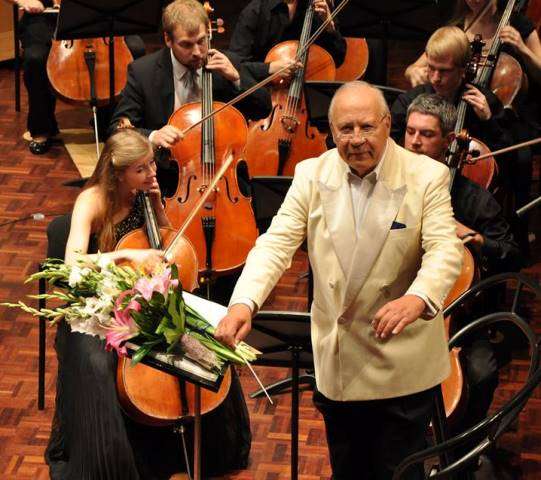|
Back
Neeme Järvi closes Pärnu Festival with style Estonia
Concert Hall, Pärnu
07/23/2013 -
Camille Saint-Saens: Symphony No. 3 ("Organ"), opus 78 (#)
Eduard Tubin: Concerto for Double Bass and Orchestra (*)
Peeter Vähi: Chant of the Celestial Lake (+)
Maarika Järvi (flute), Nikita Naumov (double bass), Ulla Krigul (organ)
Neeme Järvi (#), Christopher Dragon (+), Kaspar Mänd (*) (conductors) 
N. Järvi (Courtesy of the Pärnu Festival)
The final concert of the 2013 Pärnu Music Festival in Pärnu, Estonia was led by Neeme Järvi and two top students from the Järvi Academy for young conductors (held concurrently), Christopher Dragon of Perth, Australia and Estonian Kaspar Mänd.
Järvi, founding father of the musical dynasty that bears his name as well as the Pärnu Music Festival and the Järvi Academy, conducted the Järvi Academy Youth Symphony Orchestra July 23 at the Kontserdimaja (that's Estonian for "Concert Hall") in Pärnu in a compelling performance of Saint Saëns’ Symphony No. 3 “Organ”. It was Dragon and Mänd’s assignment to lead works by Estonian composers Peeter Vähi and Eduard Tubin, specifically Vähi’s flute concerto Chant of the Celestial Lake (Dragon) and Tubin’s Concerto for Double Bass (Mänd).
Soloist in Chant of the Celestial Lake was flutist Maarika Järvi (daughter of Neeme), with Russian bassist Nikita Naumov in the Tubin concerto. It was a program exhibiting refreshing diversity and extraordinary achievement.
Vähi wrote his flute concerto for Maarika Järvi, who recorded it in 2001 for Ccnc Records. The 1999 work exemplifies the composer’s fascination with Asian culture. In one 29-minute movement, the work is scored for flute and string orchestra. Special effects abound, including tapping of the stringed instruments, pizzicato behind the bridge and over-blowing by the flute. It began in an atmosphere of serenity, morphing into to dance and chant-like sections and including dialogue with the principal first violin and cello. Järvi gave it a soulful as well as secular interpretation, handling Vähi’s splendidly decorative writing with ease and poise. Dragon was a skillful and sensitive collaborator with the Academy Youth Symphony.
Bassist Naumov tackled Tubin’s exacting Concerto, composed in 1948 for Estonian virtuoso Ludvig Juht (an expatriate who pursued an international performing career, with the Boston Symphony among others). It is a remarkable and remarkably challenging work with the bass performing constantly in the instrument’s highest register. Naumov’s facility was daunting in that respect, lending the bass a rewarding melodic dimension. In three movements performed without a break, it began in medias res, full of energy that turned jazzy with lots of syncopation and a big string melody on top. The second movement introduced a tender bass solo that waxed heroic, following by a jaw-dropping cadenza. The Allegro marziale finale also featured formidable acrobatics. Balances with the orchestra were sometimes an issue, but Naumov kept his listeners engaged and in awe of his skill throughout. Conductor Mänd kept a firm hand on the ensemble and worked closely with Naumov, yielding another fine collaboration.
Neeme Järvi, 76, always a favorite of his countrymen, stepped to the podium for the Saint-Saëns Organ Symphony. It was a performance to relish, with Järvi employing minimal gestures to get exactly what he wanted from the orchestra musicians. That included a robust string sound and finely crafted dynamic extremes. He shaped the gentle second movement exquisitely and gave crisp enunciation to the propulsive third. The Maestoso conclusion was just that, full of drama and heavenly resonance as the strings softly voiced the main theme against the sublime piano background.
Organist Ulla Krigul sounded the king of instrument’s voice mightily, stirring all within hearing, and the grand melee of sound at the end was punctuated with matching emphasis by timpanist Heigo Rosin.
Responding to the standing ovation – the crowd simply wanted more – Järvi obliged with one of his trademark encores, the Boccaccio March by Franz von Suppé.
Mary Ellyn Hutton
|